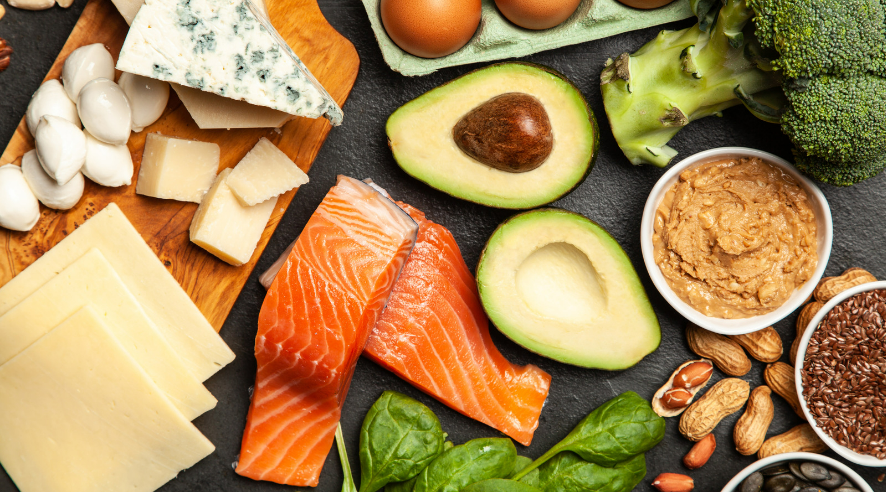The Ultimate Guide to the Ketogenic Diet: Everything You Need to Know to Get Started
- 14 December 2022

The ketogenic diet, or keto for short, is a low-carb, high-fat diet that has gained popularity in recent years as a weight loss and health improvement strategy. But what exactly is keto, how does it work, and is it right for you? In this article, we'll take a deep dive into the science behind the ketogenic diet, explore its potential benefits and drawbacks, and provide you with practical tips and strategies to help you get started.
What is the ketogenic diet?
The ketogenic diet is a high-fat, moderate-protein, low-carbohydrate diet that puts your body into a state of ketosis. Ketosis is a metabolic state in which your body burns fat for fuel instead of glucose, which is the preferred energy source for most cells. To achieve ketosis, you need to significantly reduce your intake of carbohydrates and increase your intake of healthy fats, such as avocados, nuts, and olive oil.
The ketogenic diet is a low-carb, high-fat diet that has been shown to have a number of potential health benefits. To achieve ketosis, the goal of the ketogenic diet, you need to significantly reduce your intake of carbohydrates and increase your intake of healthy fats. This typically involves reducing your carbohydrate intake to around 50 grams per day or less, which is equivalent to about two slices of bread.
It's important to note that not all fats are created equal, and the ketogenic diet emphasizes the importance of choosing healthy fats. Some examples of healthy fats that are commonly included in the ketogenic diet include:
- Avocado and avocado oil
- Nuts and nut butters
- Seeds and seed oils
- Olive oil
- Coconut oil and coconut milk
- Fatty fish such as salmon and mackerel
How does the ketogenic diet work?
The ketogenic diet works by putting your body into a state of ketosis, which has a number of beneficial effects on your health and well-being. For example, ketosis can help you burn fat more efficiently, reduce your appetite and cravings, improve your blood sugar control, and boost your energy levels. Additionally, the ketogenic diet has been shown to have a number of potential health benefits, including improved brain function, lower inflammation, and reduced risk of chronic diseases.
When you restrict your carbohydrate intake, your body starts to use its stored glycogen (glucose) for energy. Once your glycogen stores are depleted, your body switches to using ketones, which are produced by the liver from stored fat. This is known as ketosis, and it's the metabolic state that the ketogenic diet is designed to promote.
Ketosis has a number of beneficial effects on the body. For example, when your body is in a state of ketosis, it produces less insulin, which can help to reduce inflammation and improve blood sugar control. Additionally, because the ketogenic diet is high in fat, it can help you feel fuller for longer, which can reduce your overall calorie intake and support weight loss.
Potential benefits of the ketogenic diet
The ketogenic diet has been associated with a number of potential benefits, including:
- Weight loss: The ketogenic diet is an effective weight loss strategy that can help you lose weight quickly and sustainably.
- Improved blood sugar control: The ketogenic diet has been shown to improve blood sugar control in people with type 2 diabetes.
- Reduced inflammation: The ketogenic diet has been shown to reduce inflammation in the body, which may help reduce the risk of chronic diseases.
- Improved brain function: The ketogenic diet has been shown to improve cognitive function and protect against age-related decline in brain function.
- Reduced risk of chronic diseases: The ketogenic diet may help reduce the risk of chronic diseases such as heart disease, cancer, and Alzheimer's disease.
- Improved cholesterol levels: The ketogenic diet has been shown to improve cholesterol levels by increasing levels of "good" HDL cholesterol and decreasing levels of "bad" LDL cholesterol.
- Increased physical endurance: Some studies suggest that the ketogenic diet can improve physical endurance by providing a more efficient source of energy for the body.
- Reduced seizures in epileptic patients: The ketogenic diet was originally developed as a treatment for epilepsy, and it has been shown to be effective in reducing seizures in some patients.
Potential drawbacks of the ketogenic diet
While the ketogenic diet has a number of potential benefits, it may not be right for everyone. Some potential drawbacks of the ketogenic diet include:
- Difficulty sticking to the diet: The ketogenic diet can be difficult to stick to, as it requires significant changes to your eating habits and may limit your food choices.
- Nutrient deficiencies: The ketogenic diet can be low in certain nutrients, such as fiber, vitamin C, and potassium, which can increase your risk of nutrient deficiencies.
- Increased risk of heart disease: The ketogenic diet is high in saturated fat, which may increase your risk of heart disease if consumed in excess.
- Keto flu: Some people may experience symptoms such as headaches, fatigue, and nausea when first starting the ketogenic diet, a phenomenon known as the "keto flu."
- Increased risk of kidney stones: The high fat content of the ketogenic diet can increase your risk of developing kidney stones, especially if you're not properly hydrated.
- Digestive issues: Some people may experience digestive issues such as constipation or diarrhea when first starting the ketogenic diet, as the body adjusts to the new way of eating.
- Limited food choices: The ketogenic diet can be restrictive, and some people may find it difficult to stick to the diet long-term due to limited food choices.
- Increased risk of nutrient deficiencies: The ketogenic diet can be low in certain nutrients such as fiber, vitamin C, and potassium, which can increase your risk of nutrient deficiencies.
Tips and strategies for getting started with the ketogenic diet
If you're interested in trying the ketogenic diet, here are some practical tips and strategies to help you get started:
- Consult with your doctor or a registered dietitian to determine if the ketogenic diet is right for you.
- Start slowly by gradually reducing your carbohydrate intake over several weeks.
- Focus on healthy, whole foods such as nuts, seeds, avocados, and fatty fish.
- Make sure to stay hydrated and replenish your electrolytes, as the ketogenic diet can be dehydrating.




